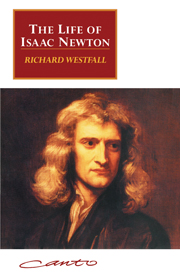Book contents
- Frontmatter
- Dedication
- Contents
- Preface
- Acknowledgments
- A Note About Dates
- Plates
- 1 A Sober, Silent, Thinking Lad
- 2 The Solitary Scholar
- 3 Anni Mirabiles
- 4 Lucasian Professor
- 5 Publication and Crisis
- 6 Rebellion
- 7 Years of Silence
- 8 Principia
- 9 Revolution
- 10 The Mint
- 11 President of the Royal Society
- 12 The Priority Dispute
- 13 Years of Decline
- Bibliographical Essay
- Index
7 - Years of Silence
Published online by Cambridge University Press: 05 September 2013
- Frontmatter
- Dedication
- Contents
- Preface
- Acknowledgments
- A Note About Dates
- Plates
- 1 A Sober, Silent, Thinking Lad
- 2 The Solitary Scholar
- 3 Anni Mirabiles
- 4 Lucasian Professor
- 5 Publication and Crisis
- 6 Rebellion
- 7 Years of Silence
- 8 Principia
- 9 Revolution
- 10 The Mint
- 11 President of the Royal Society
- 12 The Priority Dispute
- 13 Years of Decline
- Bibliographical Essay
- Index
Summary
BY THE END OF 1676, as absorbed in theology and alchemy as he was distracted by correspondence and criticism on optics and mathematics, Newton had virtually cut himself off from the scientific community. Oldenburg died in September 1677, not having heard from Newton for more than half a year. Newton terminated his exchange with Collins by the blunt expedient of not writing. It took him another year to conclude the correspondence on optics, but by the middle of 1678, he succeeded. As nearly as he could, he had reversed the policy of public communication that he began with his letter to Collins in 1670 and retreated to the quiet of his academic sanctuary. He did not emerge for nearly a decade.
Humphrey Newton sketched a few facets of Newton's life as he found it in the 1680s. Newton enjoyed taking a turn in his garden, about which he was “very Curious … not enduring to see a weed in it. …” His curiosity did not rise to the level of dirtying his hands, however; he hired a gardener to do the work. He was careless with money; he kept a box filled with guineas, as many as a thousand, Humphrey thought, by the window. Humphrey was not sure if it was carelessness or a deliberate ploy to test the honesty of others – primarily Humphrey. In the winter, he loved apples, and sometimes he would have a small roasted quince.
- Type
- Chapter
- Information
- The Life of Isaac Newton , pp. 133 - 158Publisher: Cambridge University PressPrint publication year: 1994

